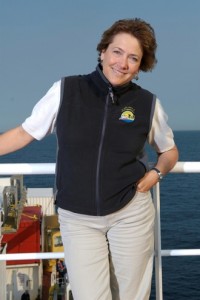
By Grace Egeland
With the start-up of the second year of the International Polar Year (IPY) Inuit Health Survey, I reflect over the work ahead while en route to Inuvik in northern Northwest Territory, a two-day plane ride from Montreal. When we were planning for this voyage in 2006, the Coast Guard informed us that our biggest challenge in moving from community to community from the far western town of Tuktoyaktuk eastward to Resolute would be navigating the ice packed waters of the Northwest Passage. Now just two years later we’re told “ice will not be a problem.” With vast areas of ice disappearing rapidly one can only wonder what repercussions lie ahead as a result of global warming.
The coastal community health survey will take place on the Canadian Coast Guard Ship (CCGS) Amundsen named after the polar explorer Roald Amundsen. While it took Amundsen a good four years to navigate the route westward in unchartered waters we will move with relative ease eastward from the Western Artic to the Eastern Arctic in just 28 days.
The rapid loss of ice in the last two years alone is a reminder that the unprecedented pace of change Inuit have endured in recent history is not going to let up. Just 50 years ago Inuvik was a town of tents and as late as the 1970s the last of the families living in their nomadic outposts moved into communities in the Baffin Region.
Inuit have a strong commitment to community and I believe this provides strength and resiliency for dealing with the changes that have already occurred and the challenges ahead. Many saw their involvement with the survey last year as a way of contributing to their community and to future generations in that the survey could provide helpful information for understanding and dealing with the many public health and health care issues now facing their communities. Each participant wanted their experience to be reflected in the collective statistics.
The survey focuses on emerging health problems among Inuit in the Arctic, including obesity, diabetes and heart attacks. The intent is to discover the factors that contribute to these conditions and to learn what ways they can be prevented. Survey results will allow individuals to become aware of their health status and the data will aid communities and the government of Nunavut in creating Inuit-specific health programs and promotion.
The plane finally lands in Inuvik and I am eager to get going with the land team training. The backbone of the project is our community research assistants and traveling land teams headed by northern nurses working side by side with bilingual Inuit land team members. The geographic scale of the survey work is daunting in that the land teams and community preparation must move efficiently ahead of the ship. We have three land teams that leapfrog over each other to stay ahead of the ship and back-up nurse interviewers who can be moved to help on land when needed. Staffing the ship research crew with individuals who can fill diverse roles is also a key to remaining flexible to deal with issues as they come up. Numerous dialects are used in the geographic regions surveyed this year requiring careful selection of bilingual Inuit interviewers to ensure all dialects are represented. Back-up and contingency plans are needed to deal with the unexpected, which should always be expected in the Arctic.
The extensive planning and consultations with Inuit that is making the IPY Inuit Health Survey possible is another aspect of Amundsen’s legacy of well-grounded plans and of incorporating Inuit advice into his strategies for exploration. The planning of our survey has involved the most consultations of any research project to date in the north. The work is being conducted in three jurisdictions with three steering committees representing the Inuvialuit Settlement Region of Northwest Territory, Nunavut Territory, and Nunatsiavut of Northern Labrador.
For me, heading this project is a complete honour and a great source of personal development and growth. As a daughter of Norwegian immigrants, I chuckle over the many family dinner conversations of Roald Amundsen and wonder if those childhood memories somehow subconsciously led me to this work. Our voyage is different from all other Arctic voyages though in that ours is a health survey that will provide the most comprehensive assessment of health indicators and health status of Inuit. It provides a snapshot of health and resiliency and of emerging chronic disease in the face of rapid changes in the north. It is a journey that is made possible by the collective team spirit to make it happen and the expectation that it can help make a difference.
Professor Egeland is the Principal Investigator for the IPY Inuit Health Survey and faculty member of the School of Dietetics and Human Nutrition and the Centre for Indigenous Peoples’ Nutrition and Environment (CINE). CINE’s Aboriginal Governing Board has pioneered participatory methods with Indigenous Peoples and provides the framework for the participatory process for the IPY project.
More information can be obtained by visiting www.inuihealthsurvey.ca.
